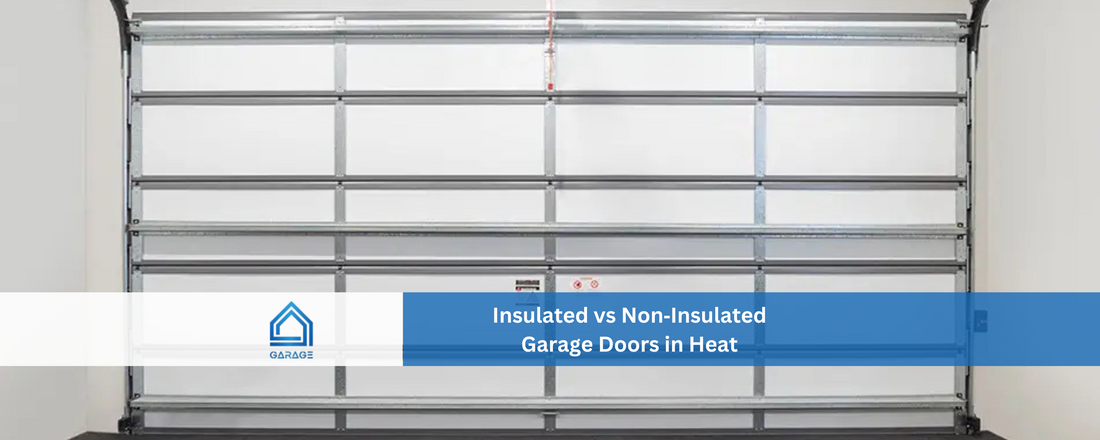
Insulated vs Non‑Insulated Garage Doors in Heat
A Garage Repair | Expert Insight for Southern California Homeowners
When the mercury climbs past 100 °F in the middle of an August afternoon, the last thing you want is a garage that feels like a convection oven. Whether you are booking a garage door installation in LA for a new build or lining up Los Angeles garage door repair on an older home, one question always comes up: Is an insulated door worth the extra cost when you live in a hot climate? This 1,000‑word guide from A Garage Repair breaks down the facts so you can choose the right solution for your home, energy bill, and daily comfort.
Why Door Insulation Matters in Hot Climates
Heat moves along the path of least resistance. In Southern California, that means blazing sunshine and dry air spill through every gap and thin panel they can find. Most attached garages share at least one wall with the living space, so when exterior temperatures spike, an unprotected garage can act like a giant radiator. That radiant heat seeps into adjoining rooms, forcing your HVAC system to run longer and harder. For families who use the garage as a laundry room, workshop, or home gym, a 20‑degree swing in temperature can turn a quick chore into an exhausting workout. The right level of insulation in the door dramatically slows thermal transfer, helping the garage stay closer to the interior set‑point while reducing AC runtime. Over a single SoCal summer, that can translate into noticeable savings on electricity—and far greater everyday comfort.

What Is an Insulated Garage Door?
An insulated door isn’t just a thicker slab of steel. Modern designs use a sandwich construction: two steel or aluminum skins wrapped around a rigid core of polyurethane or polystyrene foam. Manufacturers rate the finished product with an R‑value (resistance to heat flow) or U‑factor (overall heat transmission). Higher R and lower U mean better insulation. Additional upgrades—like thermal breaks between metal components, bulb seals along the perimeter, and high‑performance glass in any windows—further improve energy performance. When you schedule garage door installation with A Garage Repair, our techs measure the opening, review your climate targets, and recommend a door with the right R‑value for hot, sunny conditions.
Benefits of Insulated Garage Doors in Southern California Heat
-
Reduced Heat Gain and Lower Energy Bills
Independent studies show that an insulated door can keep garage temperatures 10‑15 °F cooler than a non‑insulated panel during peak heat hours. That buffer means your interior air conditioner cycles less often, trimming seasonal electricity costs. -
Quieter Operation
The foam core dampens vibration, so the door sounds more like a soft rumble than a metal drum every time it opens. If your kids’ bedrooms sit above the garage, that noise reduction is a daily win. -
Stronger Build and Better Durability
Sandwich panels resist dents and warping, a valuable trait when intense sun exposure can bake paint and weaken unreinforced metal over time. -
Enhanced Interior Comfort
From DIY projects to weekend bike tune‑ups, an insulated garage is a more pleasant place to spend time. You will sweat less, tools stay cooler to the touch, and stored paint or household items are less likely to spoil in extreme heat. -
Boosted Home Value
Energy‑smart upgrades appeal to buyers. When paired with a professional garage door installation in LA, an insulated door can increase curb appeal and add a marketable efficiency feature.
When a Non‑Insulated Door Might Still Work
There are situations where a basic, single‑layer steel or aluminum door remains the pragmatic choice:
- Detached Garages or Sheds – If the building stands separate from conditioned space, heat transfer into living areas is less of a concern. A budget‑friendly panel may suffice.
- Tight Renovation Budgets – Homeowners juggling multiple fixes—roofing, HVAC, garage door repair—may prioritize immediate repairs and plan future insulation upgrades when funds allow.
- Minimal Daily Use – Weekend vacation homes or properties where the garage stays closed most of the time won’t see as large a payoff from higher R‑values.
Remember: even on an economy door, professional weather‑sealing around the frame plus routine Los Angeles garage door repair checks will maximize performance and lifespan.
How to Choose: Key Factors for LA Homeowners
-
Climate Zone Sun Exposure
Coastal neighborhoods like Santa Monica experience cooler marine layers, while inland areas such as Riverside see far hotter highs. Aim for at least R‑9 in mild zones and R‑13 or more inland. -
Usage Patterns
Converting half the garage into a home office? Go insulated. Storing gardening tools only? A quality non‑insulated panel with good seals may be enough. -
Door Material Aesthetics
Steel doors offer durability; composite cladding adds wood‑look charm without warping. Insulation specs vary by line, so match style and performance. -
Return on Investment
Ask your installer for energy‑saving estimates. In many SoCal zip codes, upgrade costs recover through utility savings within three to five years. -
Professional Installation Maintenance
A top‑tier door only performs if installed correctly. Trust a licensed team—like A Garage Repair—for precise track alignment, spring tensioning, and ongoing tune‑ups.

Final Thoughts & Next Steps
Southern California heat puts every building material to the test, and the garage door is no exception. Insulated models offer measurable comfort, energy, and durability advantages, especially for attached garages and high‑use spaces. Non‑insulated options still have a place for detached buildings and strict budgets, but they demand diligent sealing and periodic garage door repair to meet the challenge of summer sun.
If you are ready to compare models or schedule a garage door installation appointment, call A Garage Repair (747) 224‑2232 today or request a quote online. Our local technicians serve all of Los Angeles County and the surrounding SoCal communities with fast, friendly service—so your garage stays cool, secure, and trouble‑free every season.
